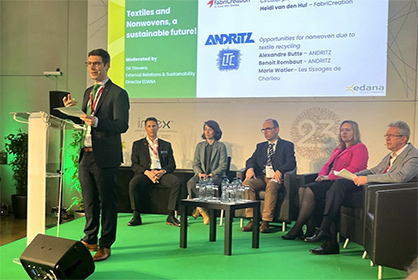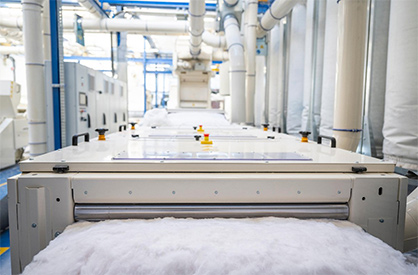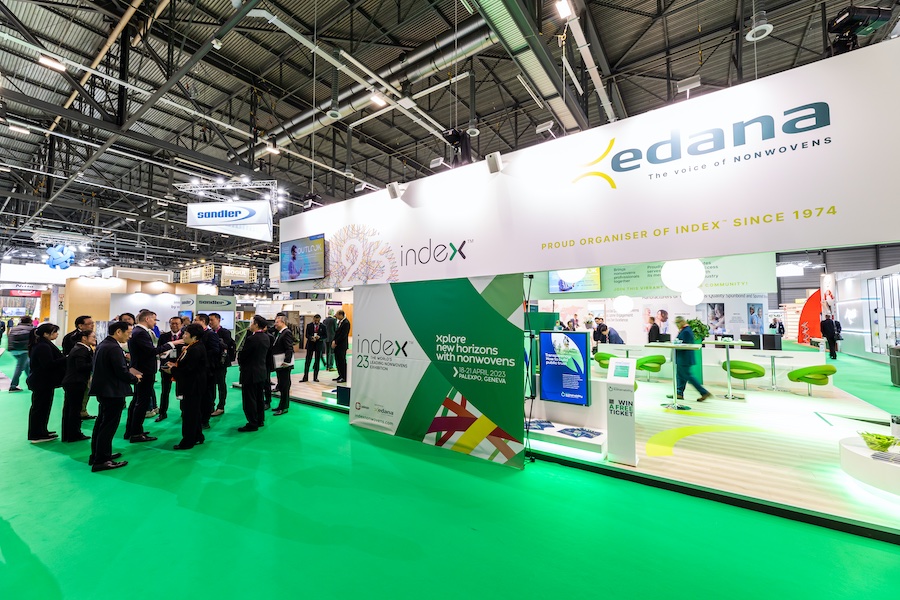#INDEX 23
A 100% record in recycling
This was one of the key takeaways from a full and lively seminar, Textiles and Nonwovens, A Sustainable Future, held during INDEX™23 in Geneva.
Moderator Gil Stevens, EDANA’s External Relations and Sustainability Director, explained that the European Commission’s Strategy for Textiles is calling for all textile products on the EU market to be durable, repairable, and recyclable – and largely made of recycled fibres – by 2030.
“About 5.8 million tons of textiles are discarded every year in the EU – approximately 11kg per person – and clothing accounts for 81% of it,” he said.
Value retention
Today only between 30-35% of the annual total textile waste generated in Europe is collected separately and very little of that is returned to fibre form to enable true value retention.
By 2030 the aim is that up to 80% of the total waste will be recycled in some way and that the share of fibre-to-fibre recycling will grow to around 2.5 millions tons.
The rapid progress of new companies, based largely in Scandinavia, who are involved in ventures to turn waste clothing back into pulps from which spinnable new fibres can be produced has captured the attention of many major apparel brands. However, there will not be anywhere near enough fibre capacity available from these new companies by 2030 to meet the EU’s targets for the fibre-to-fibre recycling of waste clothing.
Options
Mark Croes, consultant for the hygiene and medical sectors at Centexbel, provided an overview of available recycling options – mechanical, thermal or biochemical – and their varying levels of industrial readiness. His presentation was based on a Centexbel study commissioned by the European Commission that can be accessed here.
While businesses pursue the holy grail of closed-loop recycling, the Centexbel study emphasises that established open-loop systems already successfully process textiles into usable products and a combination of reuse and closed and open-loop solutions is required.

Many nonwovens are already based on long-established open-loop mechanical recycling processes, currently largely from industrial waste by-products, but with the potential to be made from post-consumer waste too.
For the automotive industry for example, recycled fibres are employed to make insulating webs for sound and heat insulation, hard-pressed parts for floors, doors and seat linings, luggage compartment and boot linings and some filter media.
In the furniture industry, recycled fibre applications include mattress covers and webs, seating padding, wallcoverings and wiping cloths, in addition to carpet backing and underlay.
There are also extensive applications in building and construction for recycled fibres, in a range of insulation products and as filling materials.
Content
It was observed at the INDEX™23 seminar that many of these products are often considered ‘second life’ materials and their manufacture has been somewhat demeaned by being termed ‘downgrading’, by champions of a fully circular economy.
In reality, effectively doubling the life of any product that can’t enter a fully circular system will be extremely useful in attempting to meet the near-term goals of the EU’s Textiles Strategy.
“The nonwovens industry should be proud of the applications for recycled fibres it has already developed,” said Andritz Nonwovens General Manager Alexandre Butte. “Even with the latest fibre-to-fibre chemical recycling methods being commercialised, only 30-40% content can be incorporated into yarns for conventional spinning and we are already achieving 100% in many high-value products.”
Nouvelles Fibres Textiles?
As a leader in nonwovens technology, and that for recycling technology following its acquisition of French specialist Laroche at the end of 2020, Andritz announced a new partnership with French companies Pellenc ST and Synergies TLC to set up a new industrial-scale business combining automated sorting and fibre recycling technology. The new business, Nouvelles Fibres Textiles, will combine Pellenc ST’s automated sorting technologies with Andritz recycling technologies. “This new company will process post-consumer textile waste to produce recycled fibres engineered for the spinning, nonwovens and composites industries,” said Alexandre Butte. “Starting operations soon, it will serve as a production line for Nouvelles Fibres Textiles, as an R&D line for the three partners, and as a test and demonstration centre for customers. A key aim is to unlock the potential of automatic sorting so that we can use more recycled fibres in the nonwovens world.”

Producer pays?
France has operated a “producer pays” EPR (extended producer responsibility) scheme for textiles for over a decade now, under which brands and retailers putting products into the market are charged a fee to cover the cost of recycling them. The French scheme includes an ‘eco-modulation’ component, resulting in a reduction in fees for products that are easy to recycle or that contain recycled content, and the end goal is to incentivise design for durability and make products last longer.
Effectively, what this has led to, is businesses receiving €1 for every kilogram of recycled content they put onto the market – a significant concession when considering the huge volumes that can be involved. “This is incentivising the use of recycled materials by making it economically advantageous,” Alexandre Butte said.?Sweden and The Netherlands are also now planning to introduce their own EPR schemes, and an EU-wide scheme will come into place in 2025. Consultant Heidi van Den Hul of fabriCreation also made a presentation at the INDEX™23 seminar showcasing a range of sustainable companies operating in The Netherlands and making the case for recognising the true value of textiles.
“Nowadays, unfortunately – and this is part of the problem for recycling – the quality of materials has been really downgraded with the move to fast fashion,” she said. “We are doubling consumption every ten years and we simply cannot afford it, which is why we need to establish a circular economy.” All in all, the issue of post-consumer textile waste is rapidly rising up the agenda and represents major new opportunities for the nonwovens industry.














